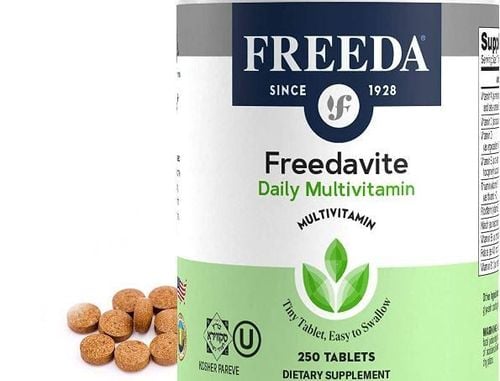This is an automatically translated article.
To have a healthy pregnancy, babies born with good health and intelligence, women need to take vitamin and mineral supplements before becoming pregnant. The supplement of multivitamins before pregnancy should strictly follow the doctor's instructions on how to use, dosage, ... to take care of health in the best way.1. Why is it necessary to take a multivitamin before pregnancy?
If you are trying to have a baby, you should eat a healthy diet so that your body gets the nutrients it needs. Besides, it is also very important to take vitamin supplements before pregnancy. Vitamins contain many of the same vitamins and minerals as in a daily multivitamin, but they usually contain higher levels of folic acid and iron.
Most of the vital organs in the developing fetus are formed after 10 weeks of pregnancy, so it is important to get these essential vitamins in advance, as to maintain adequate levels of these nutrients. This in the blood can take a long time. Optimally, levels of folic acid and other vitamins will accumulate weeks or months before conception. In this article, we will provide useful information about which vitamins to supplement before pregnancy that you need to know.
1.1. The importance of prenatal vitamins A healthy diet is the best way to get the vitamins and minerals you need. But during pregnancy, you may be deficient in important nutrients. If you are pregnant or planning to become pregnant, prenatal vitamins are the best choice for you.
Prenatal vitamins contain a large amount of important nutrients to meet the increased nutritional needs of pregnant women. Vitamin preparations usually contain a lot of folic acid (the most important vitamin for the development of the brain and spine of the fetus), iron, vitamin A, vitamin B6 and may also contain vitamin D, vitamin C, and vitamin E. , minerals such as calcium, zinc, iodine and copper.
1.2. When to take prenatal vitamins? The ideal time that experts recommend is 1 month before you plan to get pregnant. The first few weeks are a really crucial time for the health and development of your unborn baby. Taking folic acid and other vitamins before birth can help reduce the risk of some birth defects. Accordingly, you need to continue to take vitamin supplements throughout your pregnancy.

Phụ nữ chuẩn bị mang thai có thể bổ sung vitamin theo chỉ định của bác sĩ
1.3. Do prenatal vitamins have side effects? Prenatal vitamins are almost always packaged in tablet or capsule form for best absorption. However, some pregnant women may experience constipation when using it. So to avoid constipation, you need to note:
Drink plenty of water, from 2-3 liters of water/day. Eat high-fiber vegetables and fruits Lightly exercise, but make sure you get your doctor's approval. Consult your doctor if constipation becomes severe.
2. What vitamins need to be supplemented before pregnancy?
Some essential vitamins that mothers need to supplement before pregnancy include the following types:
Folic acid: This is the most important vitamin to supplement when planning to become pregnant. It is good for both pregnant women and fetuses. This vitamin increases blood circulation and reduces the risk of anemia during pregnancy by increasing the production of blood cells in the pregnant woman's body. It also helps fight fatigue during pregnancy. Most importantly, it reduces the risk of neural tube defects and fetal growth retardation. Folic acid is also essential for the development of the brain and spine. This timing is key: Neural tube defects, such as spina bifida, happen very early in pregnancy, before many women even know they're pregnant. Taking a daily supplement with at least 400 micrograms of folic acid or more as prescribed by your doctor if you are at high risk of having a baby with a neural tube defect, starting one month before you conceive may reduce Your child's risk of NTDs is up to 70%. Iron: Iron helps your body make blood to deliver oxygen to your unborn baby. Iron can reduce the risk of anemia and prevent premature birth and low birth weight in babies. You need an extra 27 milligrams of iron per day during pregnancy to support your increased blood volume and for the developing fetus. However, do not overdo it. When your body stores excess iron, it's potentially dangerous, so supplement with no more than 45 milligrams per day. Vitamin B6: Prenatal vitamins often contain vitamin B6, which can help relieve symptoms of morning sickness. There's even evidence that taking a prenatal vitamin in the months leading up to pregnancy can help you avoid morning sickness. Recommended intake of B6 for pregnant women - 1.9 milligrams/day. Calcium: Your baby developing in your uterus needs to use calcium to develop teeth and bones. Calcium and vitamin D help prevent the risk of bone loss in pregnant women and help the fetus develop better. Prenatal calcium supplementation also reduces the risk of preeclampsia. You also need about 1,000 mg of calcium per day both before and during pregnancy. Prenatal vitamins contain calcium, but dosages in most supplements range from 200 to 300 milligrams. So you should add calcium through foods that contain a lot of calcium such as eggs, milk, shrimp, crabs... Omega-3 fatty acids: They are fats, not vitamins, but omega-3 fatty acids play a role. An important role in the development of your baby's brain and eyes. Some prenatal vitamins contain omega-3s. You can also get omega-3s from food sources, such as salmon. Iodine: During pregnancy, iodine helps develop the baby's brain and nervous system. It's another important mineral not found in all prenatal vitamins, it can be found in fish, dairy products and iodine-fortified foods like iodized salt and some breads. and cereals. Iodine deficiency has also been associated with maternal, fetal, and neonatal hypothyroidism. According to a study, women who take iodine supplements before and during pregnancy can help babies born with higher IQs and better health.

Axit béo omega-3 là một trong các loại vitamin cần thiết mà mẹ cần bổ sung trước khi mang thai
In order for the child to be fully developed, women before becoming pregnant need to take additional drugs, essential nutrients and vitamins according to the doctor's recommendations on dosage, time of use,...
To help Women better understand the importance of health care before pregnancy, understand what supplements need to be taken before pregnancy, what medicine should be taken before pregnancy?... Vinmec has implemented a private program counseling and health care before pregnancy.
Vinmec's pre-pregnancy health care and counseling program is methodically and scientifically built, implemented by a team of leading nutritionists, obstetricians and gynecologists from major hospitals around the world. country, helping you have complete knowledge about nutrition and health during before and after pregnancy to have the healthiest pregnancy.
Please dial HOTLINE for more information or register for an appointment HERE. Download MyVinmec app to make appointments faster and to manage your bookings easily.
References: plannedparenthood.org, mayoclinic.org, .babycenter.com












